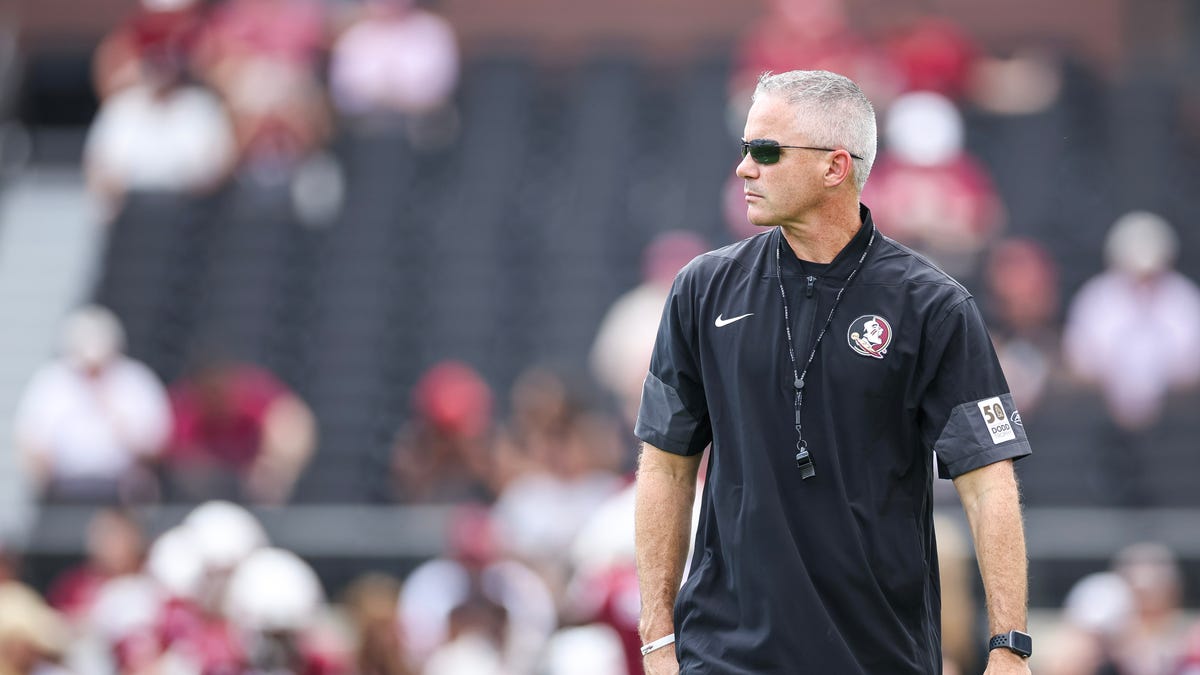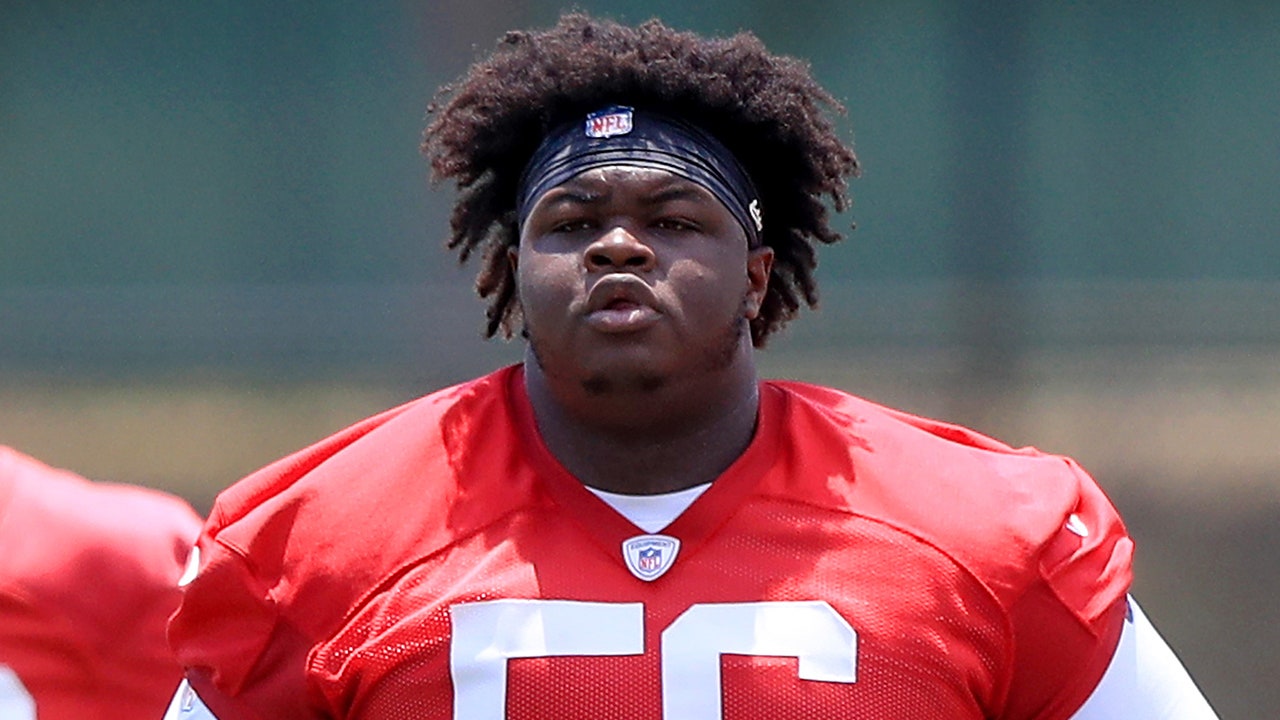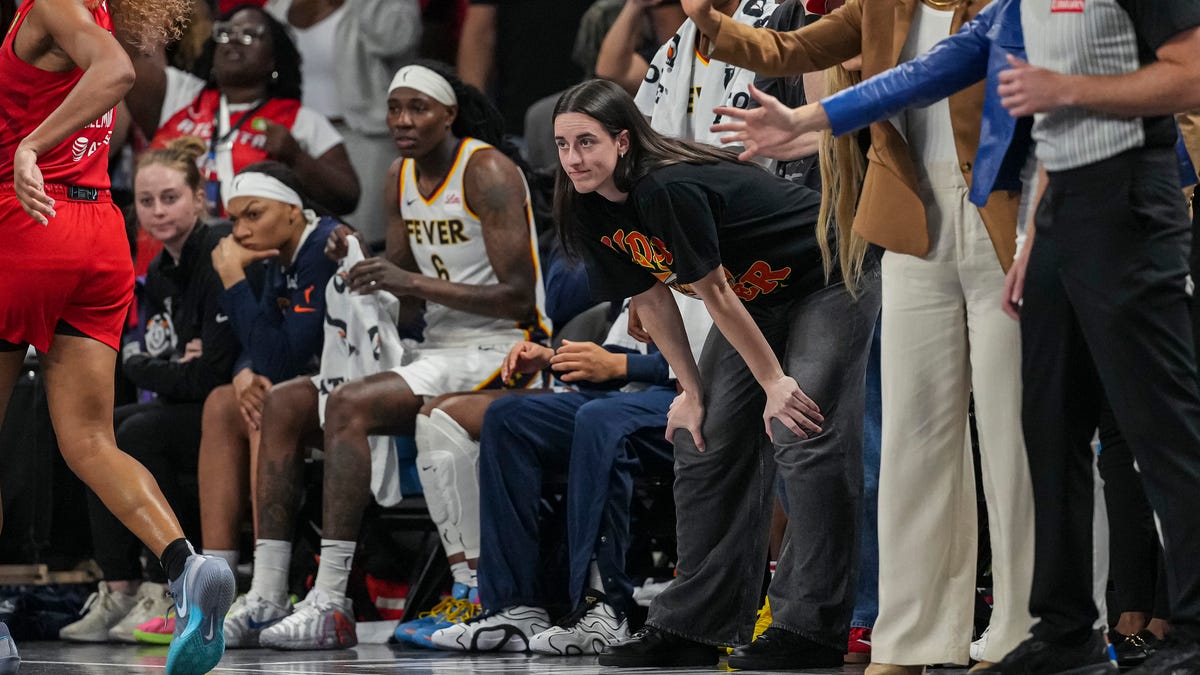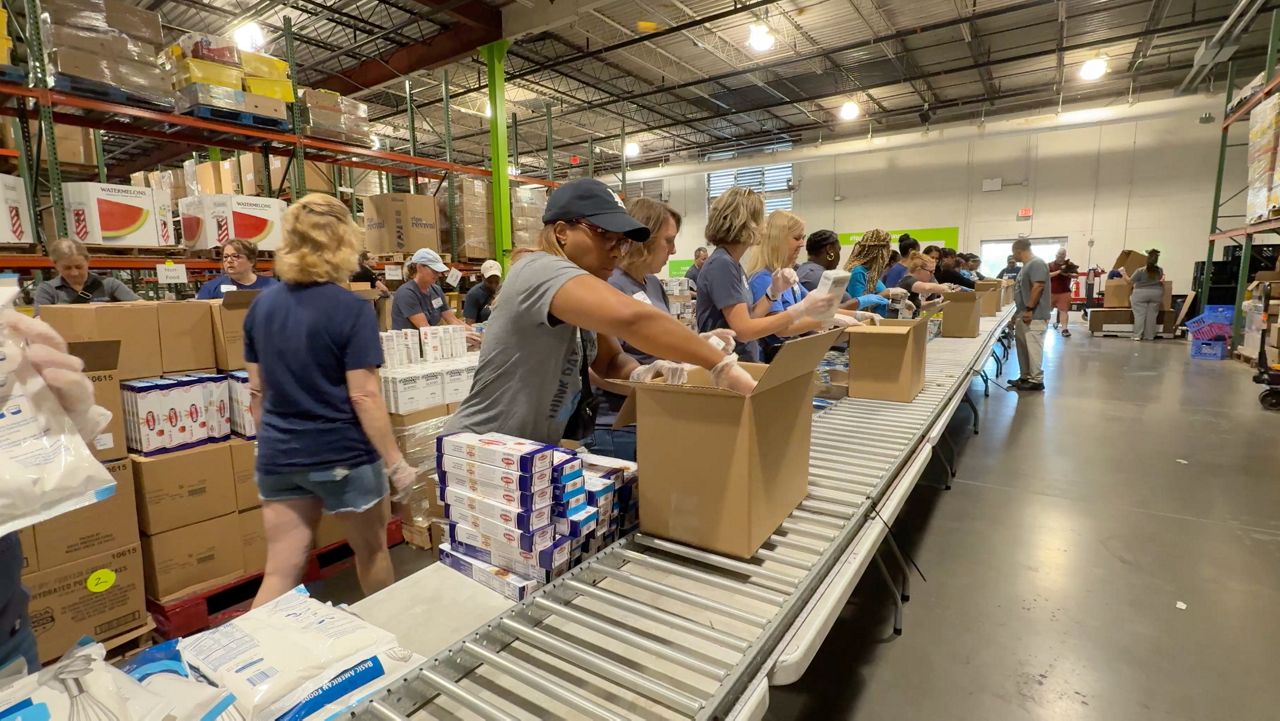Florida
Ex-Florida QB Jalen Kitna breaks silence after he’s cleared of child porn charges

Former Florida Gators quarterback Jalen Kitna broke his silence one month after his child pornography charges were dropped.
“Out of respect to the legal process I have chosen to remain silent the last 8 months,” Kitna said Friday in a statement obtained by TMZ.
“Knowing the accusations levied against me as a teenager were not accurate and would be proven to be not true. The extensive 6 month long investigation brought the prosecution to the conclusion I knew all along — this was not a child pornography case.”
Gainsville police arrested Kitna, the son of retired NFL quarterback Jon Kitna, on Nov. 30 when they received a tip that a Discord user shared an explicit photo of prepubescent girls on the platform.
He faced three counts of possession of child pornography and two counts of distribution of child exploitation material, the outlet reported at the time.
The then 19-year-old said he cooperated with detectives and provided his passwords as they investigated the tip.
“They told me an image I shared online was potentially of an underage female,” Kitna explained. “I was shocked, because I had found it on an easily accessible, legal site, and I was never looking for illegal material.”
“The photo included only a portion of the female body, I had no reason to believe the photo might be illegal. Regardless, they arrested me on suspicion of possessing child pornography. As they put me in handcuffs I tried to process everything. It sounded like they believed I searched out and shared illegal pictures, but I knew that I had not,” he added.
Kitna hoped he would be exonerated by the public eye, but says he is receiving judgment from people only reading the original reports.
Kitna reached an agreement with Florida prosecutors on July 5.

He plead no contest to one count of misdemeanor breach of the peace, disorderly conduct, which is not an admission of guilt.
“My family and I emphatically believe child pornography should not exist in our world,” he said. “I did not commit a crime of this nature. The facts of the investigation and the resolution show this. I hope this statement will bring clarity to all those who care to know the truth.”
Kitna was kicked off the Florida Gators days after his arrest and handed a campus ban, which he says the school lifted following his case in court.
In his statement, Kitna said all of his devices confiscated by investigators were returned to him after forensic testing was used and found “no other images that were even questionable: No photos, no videos, no chats, no searches for inappropriate material, not one illegal activity.”
Kitna revealed he had to undergo an extensive psychosexual evaluation, which is an assessment used in cases involving sexual misconduct to evaluate a client’s social and sexual history.
The evaluation, conducted by a doctor with over 40 years of experience revealed Kitna had no “deviant characteristics, had normal interests as a teenager, and I’m in the lowest possible percentile for likelihood to commit a crime,” according to Kitna.
“I know I did not commit the crime people assumed and maybe believed. I have learned the lesson of how quickly naive decisions can lead to catastrophic consequences,” the statement said. “I’m sorry my family and friends have had to go through this unimaginable 8 months, their love and support throughout has been humbling and encouraging.”

Kitna claimed prosecutors insisted on a misdemeanor charge rather than dropping them entirely.
The former college athlete said he took the plea deal as it was the best option for him to return to normal life as a student with the possibility of reviving his football career.
“The certainty of the plea, with no real consequences, is the best way to help me move forward to pursue a college degree, a football career, and my life as a now 20-year-old,” he added.

Florida
Jesuit’s Will Griffin becomes 10th Florida high school QB to throw for 10K yards

TAMPA – Jesuit High School senior quarterback Will Griffin always idolized Florida Gator football legend Tim Tebow.
“I look up to him,” Griffin said.
However, it’s Tebow that is now looking up at Griffin, at least when it comes to the high school football record books.
What they’re saying:
“He’s definitely the once in a career type of player,” Jesuit head coach Matt Thompson said. “You don’t really get it that much. Not as a quarterback. I have not had a quarterback be as special as Will.”

In the first game of the 2025 season, Griffin surpassed the 10,000 passing yards career milestone. He is just the 10th player in high school football history in the sunshine state to ever join that club, according to MaxPreps. Tebow finished his career at Nease High School with 9,765 passing yards.
“10,000 was amazing,” Griffin said. “It is really hard to do that. I’ve got to remind myself that I go out here and play for the team. I am not playing for myself or the stats that follows. If you can have a good team around you and a great defense to get you the ball, a great offense that can score, the stats will naturally come.”
The backstory:
It certainly helps he was able to play varsity football as a seventh and eighth grader under Tampa Bay Buccaneers legend Mike Alstott at Northside Christian. Griffin makes it clear; however, he does not deserve all of the credit for hitting this mark.
“I wouldn’t be here if it wasn’t for the offensive line,” Griffin said. “If it wasn’t for the receivers catching my passes. If it wasn’t for the running backs running touchdowns to open up the pass. A lot of things go into it.”
READ: State Basketball Championships moving to Jacksonville after decades in Lakeland
A lot of things go into his success, but Jesuit head football coach Matt Thompson says Griffin has a lot of the traits to be successful.

“He has all of the measurables,” Thompson said. “[He has] the size, the speed, the strength and the arm strength as a quarterback. His football IQ is outstanding. He understands the game. He understands the offense. He understands the defense. He’s a total package.”
The University of Florida was impressed with those abilities and offered him a scholarship. For the kid who grew up watching the Gators on fall Saturdays, it’s a dream come true.
Going to Gainesville
“It’s just home,” Griffin said. “It felt like the right place for me to be. Very excited. I want to get there. I want to help out. I want to contribute. I want to play really badly.”
However, at this moment, Griffin just wants to soak in his last few months as a high school football player.

“I am trying to enjoy it as much as I can because I know it’s going to end soon,” Griffin said. “I want to make sure I take in every moment.”
That’s because Griffin wants to be remembered not for his stats but for who he is as a person.
“I want people to remember me more as a leader rather than going to Florida,” Griffin said. “I want it to be more like, ‘He was a leader. He gave everything to the team. He never quit. He never gave up.’”
Griffin will enroll early at Florida. He was the first commit for Billy Napier in the 2026 recruiting class.
The Source: The information in this story was gathered by FOX 13’s Mark Skol, Jr.
Florida
Thousands of Northeast Florida students, community members pour out support for Charlie Kirk at vigil

ST. JOHNS COUNTY, Fla. – Students and community members from across Northeast Florida gathered Sunday evening at Veterans Park to honor conservative activist Charlie Kirk, who was killed last week while speaking at Utah Valley University.
The vigil that brought out thousands was organized by student-led chapters of Turning Point USA, including groups from the University of North Florida, Jacksonville University, Creekside High School and St. Augustine High School.
VIDEO | ‘He sparked a movement’: News4JAX political analyst discusses political impact of Kirk assassination
Kirk, who co-founded Turning Point, was known for his rallies, debates and outspoken presence on college campuses across the country.
“Somebody that inspired me, somebody who made me want to voice my own opinion and how I feel about things going around in the world and my beliefs,” Abigail Venuto said.
Gov. DeSantis condemns ‘increasing levels of political violence’ after Charlie Kirk shot at campus event in Utah
Students who talked with News4JAX said the event honored Kirk’s legacy.
“We honored his movement,” Jaden Duffey said.
Mourners lit candles and left flowers and handwritten messages at the vigil.
Duffey, former president of Creekside High School’s Turning Point USA chapter, urged unity.
“We’re in the midst of a political escalation,” he said. “Everybody needs to de-escalate and we’re not alone. We’re unified as Americans and that’s the most important thing.”
Duffey said during his time with Creekside chapter he had the chance to meet Kirk several times over breakfast.
“Someone who has accumulated millions of followers it was just stunning,” Duffey said. “Then you realize that he’s a very humble person inside.”
Duffey said he was in disbelief when he first heard the news of Kirk’s death. He said there were lots of calls and conversation leading up to Sunday’s vigil.
The St. Johns County Sheriff’s Office acknowledged the vigil in a social media post earlier in the day, saying deputies would have a “large law enforcement presence” at the park and surrounding area as a precaution.
“We’ve got to calm down,” Duffey said. “We have to bring back the American way – the first amendment right, allowing people to just disagree with one another no matter how passionate it is but violence is never the option.”
Copyright 2025 by WJXT News4JAX – All rights reserved.
Florida
Where to watch South Florida-Miami college football game today free livestream

The No. 18 South Florida Bulls play against the No. 5 Miami Hurricanes in a college football game today. The matchup is scheduled to begin at 3:30 p.m. CT on The CW Network. Fans can watch this game for free online by using the free trial offered by DirecTV.
The Bulls enter this matchup with a 2-0 record, and they have already defeated two ranked opponents this season. In their most recent game, the Bulls defeated Florida 18-16.
During the victory, Byrum Brown led the South Florida offense. He completed 23-36 passes for 263 yards and a touchdown, so he will look to perform similarly this afternoon.
Notably, Brown led the team in rushing with 66 yards on the ground.
The Hurricanes also enter this matchup with a 2-0 record, and they are coming off a 45-3 win against Bethune-Cookman.
During the victory, Carson Beck led the Miami offense. He completed 22-24 passes for 267 yards and two touchdowns, which highlights his arm talent.
Beck has thrown for four touchdowns and nearly 500 yards this season, so he will try to continue his offensive success today.
Fans can watch this college football game for free online by using the free trial offered by DirecTV.
If you purchase a product or register for an account through a link on our site, we may receive compensation. By using this site, you consent to our User Agreement and agree that your clicks, interactions, and personal information may be collected, recorded, and/or stored by us and social media and other third-party partners in accordance with our Privacy Policy.
-

 Health1 week ago
Health1 week agoWho Makes Vaccine Policy Decisions in RFK Jr.’s Health Department?
-

 Finance4 days ago
Finance4 days agoReimagining Finance: Derek Kudsee on Coda’s AI-Powered Future
-

 Business1 week ago
Business1 week agoHow Nexstar’s Proposed TV Merger Is Tied to Jimmy Kimmel’s Suspension
-
North Dakota4 days ago
Board approves Brent Sanford as new ‘commissioner’ of North Dakota University System
-
World1 week ago
Russian jets enter Estonia's airspace in latest test for NATO
-

 Technology3 days ago
Technology3 days agoThese earbuds include a tiny wired microphone you can hold
-

 Crypto3 days ago
Crypto3 days agoTexas brothers charged in cryptocurrency kidnapping, robbery in MN
-

 Crypto4 days ago
Crypto4 days agoEU Enforcers Arrest 5 Over €100M Cryptocurrency Scam – Law360



















